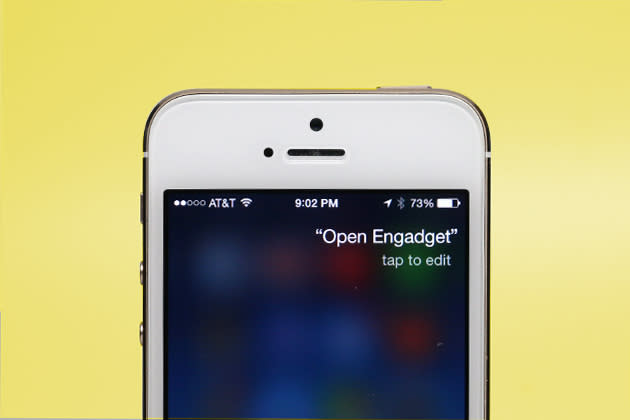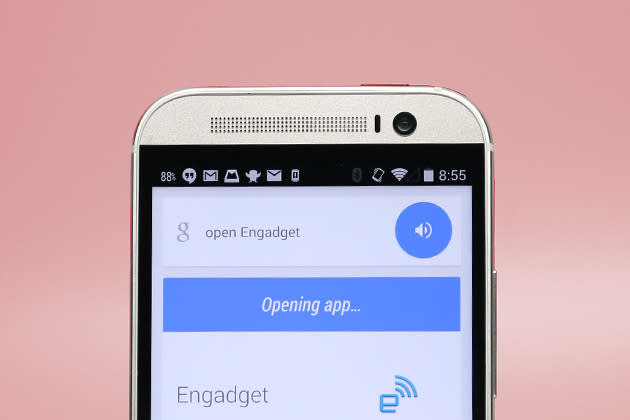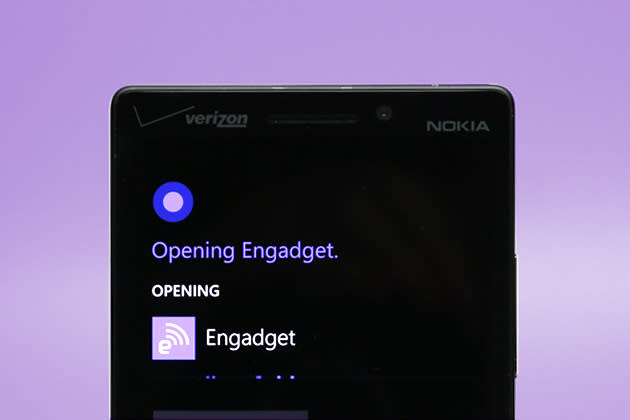Smartphones for hire: Which personal assistant is right for you?

"Ring-ding-ding-ding-dingeringeding."
This isn't a standard job interview answer, but then again, "What does the fox say?" isn't a typical question, either.
The top three smartphone platforms now feature fully functional personal assistants, and just like real-life assistants, it's not so easy to pick one at random. Each has its own talents, weaknesses and personality quirks to consider. So, I conducted a series of "interviews" with Siri, Google Now and Cortana to get to know them better -- and yes, they all know exactly what the fox says.
Siri

Apple's Siri is a seasoned assistant with plenty of experience to back up its resumé. Now nearly 3 years old, the once-beta program has had time to squash bugs and add features. And thanks to the iOS platform, it's integrated with social networks like Twitter and Facebook, as well as services like Yelp, Evernote, Fandango, OpenTable and WolframAlpha.
Siri has a jovial personality. No matter what you ask, just frame your question naturally -- for instance, "How should I dress this weekend?" -- and nine times out of 10, it'll not only understand you, but also respond in a similar fashion. If you have follow-up questions or requests, Siri will continue the conversation with you. And if you ask something silly, expect a sassy answer.
Siri is a seasoned assistant with plenty of experience to back up its resumé.
Personality's a nice touch, but it's merely a party trick if your assistant lacks functionality. Fortunately, Siri's not hurting in that area. It can dictate and send texts, emails and social network updates. It can make calls and read messages back to you. It has no problem setting (and canceling) reminders and alarms, and will display your upcoming appointments in a list. How about opening apps and changing settings? Airplane mode, WiFi, Bluetooth, you name it -- Siri's got you covered so you don't have to dig around countless screens to find stuff.
Siri's also good with watercooler talk. It told me when the next Giants home game was and how they're doing this year. When I ask about a movie, the details show up in a card-like view; and I can even buy movie tickets through Fandango. Siri also can pull up music through your library or iTunes, and it's able to pause, resume and skip songs. However, it doesn't do a good job of pulling up concert information, opting instead for a web search.
Much like both of its competitors, it can set geofences for reminders. This means you can tell it to remind you to pay the rent as you pass by the landlord's office, or stop and get a Mother's Day present when you're close to your mom's favorite store (hint, hint). Speaking of location, it can pull up local listings, which you can then filter by distance or Yelp rating; you can also use Siri for all of your navigation needs, as long as you don't have a strong aversion to Apple Maps. The service also remembers your home and work to help route your morning commute, but unfortunately, it doesn't do well at determining other places you visit frequently.
Siri's not all business though. It has a knack for finding your friends, as long as you and your entourage have the iOS app. If Steve's late getting to your house, you can ask Siri to see where he's at and it'll pull up a map with his location. While you wait for him to show up, you might as well use Siri's OpenTable integration to set up reservations for dinner.
Unfortunately, there's no hands-free option on Siri, as you have on Google Now. To activate it, you'll need to use the old-fashioned method of holding down the home button.
Hire Siri if you're looking for: Personality, dictation, social networking, music playback, sports, movies, changing settings, reading messages, finding friends.
Google Now

Of the three candidates, Google Now is the blandest. It's the kind of assistant that takes everything a little too seriously, and on the rare occasion when it tries to be funny, it tries too hard. But it's also very robust, knowledgeable and takes care of business when called upon -- and you can call upon Google without touching the device. It works great on the home screen and in the Now screen, but you can't activate it when you're in an app, or even in the app tray. That's still better than Siri and Cortana, however, which are activated by a long-press of a particular button.
It's the kind of assistant that takes everything a little too seriously, and on the rare occasion when it tries to be funny, it tries too hard.
Sure, it comes with a few Easter eggs (me: "Make me a sandwich." Google: "What? Get it yourself!"), but Google prefers function over friendliness. I can respect that -- Siri's and Cortana's jokes aren't technically all that useful anyway -- but it's disappointing that an engine like Google can't understand questions unless they're framed formulaically, such as "What's the weather like today?" instead of "What should I wear this weekend?" Some queries aren't that tough when it comes to figuring out the formula, but the ability for a voice assistant to be flexible in figuring out what a person is trying to say makes for a less frustrating user experience.
It's not the most intuitive assistant, and it's a mixed bag for basic daily tasks. Google can look through your email and remind you of upcoming flights and give you other information related to your pending trip. Of course, you can also use it to do the usual voice assistant stuff: Set reminders and alarms, visit specific websites, draft notes and make calls, as well as send texts and emails. For reminders, Google will ask you when and where you want to be pinged. And although it can set up appointments and alarms, it can't change or cancel them. (If you ask, it doesn't even understand your request.)
When it comes to travel, Google does pretty well. It recognizes the places you travel frequently, tries to figure out which one you're likely going to (often looking at your calendar for upcoming events and flights) and then leaves a card telling you how long it's going to take to get there. If it's around time for you to head home from the office, it'll give you a card that tells you how long your commute will take and which way to go. And for kicks, Google can also remember where you parked.
One of Google's less job-specific strengths is its ability to name a tune. It'll pull up information about the song you're listening to and link you to the Google Play Store. It's a talent Siri simply doesn't possess, although rumors indicate that Apple's looking into integrating Shazam. Lastly, if you're interested in using your assistant to post on social networks, take note: You're limited to Google+.
Hire Google if you're looking for: Travel and flights, navigation, dictation, music discovery, hands-free voice activation and website shortcuts.
Cortana

Cortana is the only personal assistant in the trio that has a recognizable face, and the only one that has a resumé stretching 500 years into the future. Presently, the service is brand-new and technically in beta, but it's fully functional. It'll continue to improve over time as more people use it and Microsoft's team adds functionality.
Like Siri, Cortana's got the makings of a fun personality. Jen Taylor, the voice of Cortana in the Halo series, contributes to her Windows Phone namesake by providing a lot of the program's clever quips, and you'll hear more of her voice over time. The service doesn't have quite as many quirky responses as Apple's counterpart, but wit comes with experience. Currently, Cortana's sass is limited to telling jokes, poking fun at the competition and responding to random questions about Halo and Microsoft. She'll also keep conversations going as long as you're making queries that are relevant to the topic at hand.
She can take care of nearly all of the essential tasks that a virtual assistant should have, many of which I've already discussed in earlier sections, but Cortana's greatest strength comes with her Notebook. After all, your personal assistant would jot down information about you in his or her notebook, right?
Cortana is the only personal assistant in the trio that has a recognizable face, and the only one that has a resumé stretching 500 years into the future.
Do people even use real notebooks anymore? Well, Cortana does. She uses her Notebook to learn more about you. Sure, Siri and Google Now have shown small pieces of this feature: Both services remember your relationships and recognize where you live and work. Siri gets smarter as it gets to know you, and Google displays cards with information about your favorite sports teams, stocks, cable provider, news stories and so on. So far, however, Cortana's implementation adds a lot more customization. Your list of reminders resides here, as well as your favorite places, music searches and preferred quiet hours.
But the most intriguing part of the Notebook is the section on your interests. This is a customized feed of information that keeps you posted on certain news stories and fills you in on things like your commute time, places to eat, upcoming flights, local weather and your favorite sports teams. Google has similar functionality in the way it displays cards, and can be highly useful on both.
It's also home to Windows Phone's Do Not Disturb mode, known as Quiet Hours. A personal assistant would likely know not to bug you about things after a certain time of night, unless it's incredibly important -- but if your mother is trying to get ahold of you at midnight, it's probably an emergency. Thus, you can set your quiet hours in the Notebook, as well as add a list of people (the Inner Circle) you don't mind waking you up at the worst possible time in the morning.
One of Cortana's unique traits is her ability to assign reminders and tasks to specific contacts. Let's say your brother was going in to take his school exam, and you don't want to forget to ask him; if you tell Cortana to remind you, she'll display the information on-screen the next time you dial him up. (You need to preface the request with "the next time I talk to my brother," however.) Siri and Google don't display contact-specific reminders, so this type of request just shows up in your list with all of your other general reminders.
You can rely on Cortana when you want to change settings and open apps, and it can even open up specific websites directly as long as you have a shortcut set up as a Live Tile. That's still not quite as nice as Google, which can open sites without that caveat, but it's a start. However, just like Google, Cortana can recognize music and offer links to buy the song you're listening to. She can pull up whatever tunes you want, navigate through your playlist and pause songs currently playing. She's also skilled at hooking you up with the latest weather conditions in a card-like view (which the others do just fine) and converting temperature between Fahrenheit, Celsius and even Kelvin. Conversely, I asked Siri to convert to Kelvin and it showed me how hot it was in Kelvin, Australia.
Unfortunately, the service's beta status also means it's not complete. Cortana doesn't appear to have any attachments to social networking yet, though I wouldn't be surprised to see this change down the road. She also doesn't have hands-free activation, so you have to hold down the search button and then speak your voice commands. Finally, she also has trouble dictating punctuation, so "period" and "question mark" were transcribed as actual words instead of grammatical marks.
Hire Cortana if you're looking for: Personality, navigation, appointments and reminders, weather, music discovery, changing settings, Do Not Disturb.
Who gets the job?
Don't you hate it when there isn't a clear-cut answer? Truth is, all three services do the basics quite well -- appointments, reminders, dictation, making calls, sending messages and so on. But each one has its own array of talents to set it apart and its own obstacles to overcome. Between Siri's experience, Cortana's Notebook and Google's hands-free functionality, you could hire any of the three and still be happy.
If you're not looking for a specific feature or strength, however, you may need to bring them in for a follow-up interview.
(Updated to reflect contact-specific reminders on Cortana and navigation features on Google Now.)
